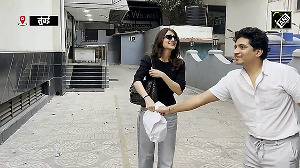During the 2005 deluge, rickshaw drivers in Mumbai charged five times the fare to take people home. It was their moment to 'seize the opportunity'.
There was a time when sharing a rickshaw or taking the bus made economic sense.
It's unfair to generalise, but the poor attitude of rickshaw and taxi drivers is a major reason why Ola and Uber are easily breaking into markets like Mumbai, Delhi and other cities.
September 2 autorickshaws will again be on strike in many metros!
 If you travel in Mumbai by road for even a day, you will agree that the greatest problem residents face is the commute.
If you travel in Mumbai by road for even a day, you will agree that the greatest problem residents face is the commute.
While local trains are the fastest and a more reliable mode of transport, should you have to travel between stations, you are at the mercy of taxis and autorickshaws.
Any Mumbaikar, who doesn't use a car or two-wheeler for his commutes, has at some point experienced the arrogant attitude of taxi and auto drivers.
The worst is their 'freedom' to refuse a ride, just when you, the consumer, are in a dire situation.
A ride is refused for these unfair reasons: a) the distance is too short b) the destination you want to go is less popular (no return fare) c) or simply meri marzi (my wish).
Unfortunately buses are often not on time or one wouldn't have to rely on these unhelpful characters.
We share a few incidents from readers and friends about autos and taxis:
Rediff.com reader Vidyanand Shetty remembers how he could not get an auto for 30 minutes on a day when he had to be at funeral of someone in his family.
"There were at least six rickshaws parked outside the gate. Each of them refused to take me to the station. Only after I threatened to damage the vehicle, one of them agreed."
An elderly gentleman too shares his ordeal. "My wife was in the hospital. I had to rush home to get some documents. All the rickshaws that passed the hospital refused to entertain my plea, because it was past midnight and the distance was too short (two kilometres). I had to wait for more than 20 minutes before I could find one who agreed."
Some months ago, Pratika and her cousins travelled to Ahmedabad and took a metered rickshaw to Akshardham temple. At the end of the ride, the driver demanded three times the fare.
"I found something fishy so, I googled and found that the fare he was charging was too high for the distance we had travelled. I also realised that he had taken a longer route to reach the place. He argued that information on the internet is not reliable."
Pratika and her cousins took the rickshaw to the nearest police station where the rickshaw driver’s claims were busted.
During the 2005 deluge, Mumbai rickshaw drivers charged five times the fare to take people home because it was their moment to 'sieze the opportunity'.
There was a time when sharing a rickshaw or taking the bus made economic sense.
It's unfair to generalise, but the poor attitude of rickshaw and taxi drivers is a major reason why Ola and Uber are easily breaking into markets like Mumbai, Delhi and other cities.
Given their competitive pricing policies, we wonder how long they will survive and if they can replace the taxis and autos.
Like a colleague's friend rightly said, "If Mumbaikars ditch autos and taxis for a month, there is a good probability their families will suffer and they might mend their ways."
Dear Readers,
What's your experience been like with auto and taxi drivers been?
Do you get rides at first request? How do you deal with arrogant drivers?
Do you think cab operators like Ola and Uber are better alternatives in your locality?
Share your views and experiences, good and bad with us. Write to getahead@rediff.co.in (subject: Auto and Taxi Woes) along with your NAME, AGE and the place you LIVE in. We'll publish the best ones right here on Rediff.com.
Lead image used for representational purposes only. Image: Patrick Bensamou/Wikimedia Creative Commons











 © 2025
© 2025